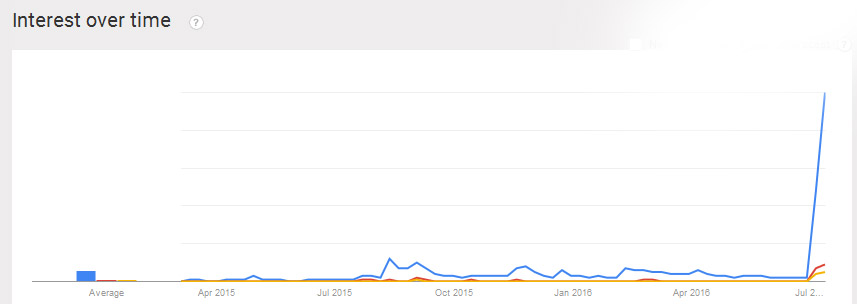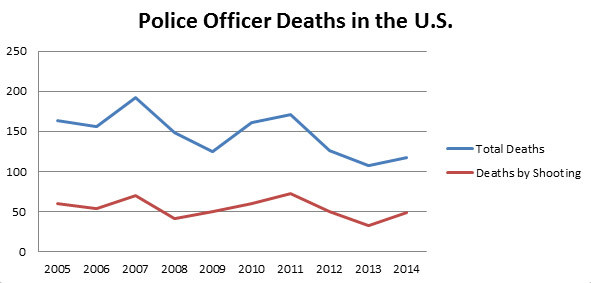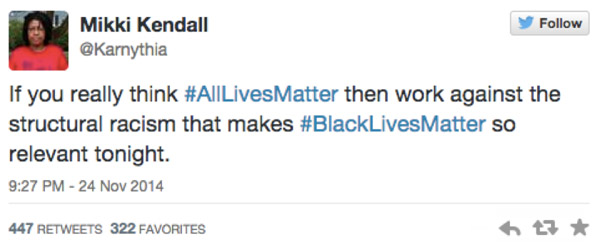Thoughts and Links on Black Lives Matter
I’ve been getting into a number of discussions and arguments lately, and wanted to put my thoughts and some links together in one place to refer back to.
Black Lives Matter was created by three queer Black women: Patrisse Cullors, Opal Tometi, and Alicia Garza after the killing of Trayvon Martin. From the BLM website, “Black Lives Matter affirms the lives of Black queer and trans folks, disabled folks, Black-undocumented folks, folks with records, women and all Black lives along the gender spectrum.” BLM’s principles include diversity, empathy, and the affirmation of black women, black trans folks, and black families.
11 Major Misconceptions About the Black Lives Matter Movement. Including misconceptions like “The movement hates police officers,” “The movement hates white people,” and “The movement doesn’t care about black-on-black crime.”
#
But Don’t All Lives Matter?
Sure. And nobody has suggested otherwise. It seems like when (mostly white) people hear “Black Lives Matter,” they imagine a silent “Only” at the beginning. Or maybe they’re imagining a silent “More Than Others” at the end, I’m not sure. But these sentiments are imaginary. Perhaps they’re a projection. Perhaps it’s simple fear. Perhaps it’s just a lack of understanding.
When I say fundraising and research for diabetes matters, I’m not suggesting that other diseases don’t deserve research and funding. But as a diabetic and the son of a diabetic, one who’s seen diabetic friends suffer severe complications from the disease, this is something I think it’s important to work on.
The problem with “All Lives Matter” — one of the problems, at any rate — is that it came about as a response to Black Lives Matter. Here’s a Google Trends search showing the popularity of the phrases “Black Lives Matter” (in blue), “All Lives Matter” (in red), and “Blue Lives Matter” (in yellow):
 There’s no Google traffic on “All Lives Matter” or “Blue Lives Matter” until after the BLM movement began gaining popularity. In other words, the evolution of “All Lives Matter” hasn’t been as a simple affirmation that yes, all lives do matter — something nobody has been arguing. Instead, it’s a direct response to the BLM movement.
There’s no Google traffic on “All Lives Matter” or “Blue Lives Matter” until after the BLM movement began gaining popularity. In other words, the evolution of “All Lives Matter” hasn’t been as a simple affirmation that yes, all lives do matter — something nobody has been arguing. Instead, it’s a direct response to the BLM movement.
To be blunt, it’s people who hear someone saying, “Black lives matter!” and rather than agreeing that yes, this is a true statement, people try to change the focus of the conversation. I don’t know where this knee-jerk attempt comes from, but the effect is to make it harder to talk about the problems facing black people. In other words, you are making yourself one more obstacle to progress.
Because right now, in our society? All lives don’t matter. We don’t treat all lives as equally important. Hell, even our judicial system is more likely to execute a black defendant than a white one, when all else is equal.
If you really want all lives to matter, then you need to join the effort to make black lives matter too. Otherwise, your cry of “all lives matter” is just empty words.
#
What About the Police? Blue Lives Matter Too!
Again, nothing about the Black Lives Matter movement states or suggests that police lives don’t matter. From BLM’s official statement after the shooting of Dallas police officers, “Black activists have raised the call for an end to violence, not an escalation of it.”
There’s a narrative that we have a war on the police here in the U.S., but the data don’t seem to back that up.
Preliminary data show that we’ve seen the exact same number of police deaths in 2016 as we had by this point last year.
None of this means those deaths are acceptable, or that they shouldn’t be mourned. None of it means police lives don’t matter. They do, and Black Lives Matter isn’t saying or suggesting otherwise.
There’s a great deal of fear, distrust, and anger toward the police in this country. That’s not equivalent to a war on police. Nor is it a suggestion that police lives don’t matter.
To be a good police officer is a difficult, stressful, and at times dangerous job. I think it’s possible to acknowledge this, and to mourn those officers lost in the line of duty, without coopting or undercutting another movement.
#
But Racism is Over!
2015 Data on Police Killing of Blacks. “Whites make up a disproportionally smaller portion of those killed by law enforcement compared to their portion of the general population – 11.3% less. Blacks on the other hand make up a disproportionally larger portion of those killed (26.5%) compared to the general population (13.2%) – 13.3% more or double!”
Analysis of Racial Bias in Police Shootings at the County-Level in the United States, 2011–2014. “The results provide evidence of a significant bias in the killing of unarmed black Americans relative to unarmed white Americans, in that the probability of being {black, unarmed, and shot by police} is about 3.49 times the probability of being {white, unarmed, and shot by police} on average … the racial bias observed in police shootings in this data set is not explainable as a response to local-level crime rates.”
Two Thoughts on Ferguson. A blog post I did two years ago, gathering data to show that the percentage of people killed by police in the U.S. is significantly higher than in other countries, and that from 1999 to 2011, the statistical likelihood of being killed by a police officer in the U.S. was about three times higher for black people than for whites.
Black and White in the U.S. Another blog post with additional data. Here are some highlights:
- Blacks comprise 13 percent of the U.S. population, and are consistently documented by the U.S. government to use drugs at similar rates to people of other races. But blacks comprise nearly one-third (31%) of those arrested for drug law violations – and more than 40 percent of those incarcerated in state or federal prison for drug law violations.
- A 2012 study found that unemployment rates “were highest for Blacks (13.8 percent) and for American Indians and Alaska Natives (12.3 percent).“
- On average, blacks receive almost 10% longer sentences than comparable whites arrested for the same crimes.
- The median wealth of white households is 20 times that of black households.
These problems aren’t new. It’s just getting harder for us to shut our eyes and plug our ears and pretend it’s not happening.
#
Misc:
All Houses Matter: The Extended Version – This comic by Kris Straub does a nice job (in my opinion) of creating an analogy to help people understand why the “All Lives Matter” response can be so frustrating.
I obviously don’t know first hand what it’s like to be black in America today. I’ve been working to read and better understand, but that understanding is always going to be imperfect and second-hand. There’s a lot I didn’t get into here, and there are doubtless many things I’ve simply missed or overlooked.
I reserve the right to come back and add and update this post as my understanding evolves, or as I discover new data and resources.









Nicole Montgomery
July 12, 2016 @ 7:08 pm
Beautifully said, Jim. You always make me think, make me feel, and stand as an inspiration.
RSA
July 12, 2016 @ 9:50 pm
Thanks for trying to be part of the answer, and not the problem.
Mr. T
July 13, 2016 @ 11:59 am
here’s what I’ve seen in my twitter and facebook newsfeeds – for every post about black lives matters, blacks kiled by police, examples
of racist policing, or calls for solutions to racist policing, I see about ten posts about why alllivesmatters is racist, and what black lives matters is supposed to mean, or some other semantic issue. Even the black matters website devotes a lot of space to
talking about black lives vs. all lives. It seems like a collosal waste of
energy and misdirection. Maybe because I’m not friends with or a follower of the assholes posting tons of all lives matter jibber jabber I’m only seeing half the conversation, but it seems pointless. the police disproportionately
target people of color. There are very few consequences for bad policing. our liberal gun laws are making usless safe, not more safe. So why are we wasting so much breath on the semantics of what the movement is called?
thomashewlett
July 13, 2016 @ 1:58 pm
I think the semantics reveal markedly different world views and that needs to be addressed. Talking about the words is getting at the way people view each other and their ability/inability to put themselves in other peoples shoes. When someone counters with “All Lives Matter,” it tells me that maybe they can’t conceive of a situation, for example, in which the police would shoot them without them having justifiably provoked it. This is a major hurdle we need to get past if this person and I can have the important conversation about police reform and civil rights. In that sense, I don’t it’s a waste of time but rather a crucial conversation.
Mr. T
July 13, 2016 @ 2:37 pm
I guess I get that. Again, I don’t see a lot of the “alllivesmatters” arguments, so I don’t know what range of stupidity they have. I’ve just been a little frustrated at how the conversation has gone – it seems like more effort is put into arguing about the semantics of the movement, in keeping with the left’s general obsession with language, rather than on strategizing how best to change laws and policing practices in order to have more accountability for police and change how police interact with young men of color. Maybe some of the alllivesmatter/blacklivesmatter discussions end up enlightening people about the disparity between how white and black people are treated by the police and court system, and so is helpful. Or maybe it is just more of people yelling at each other on the internet, which is less helpful.
I just want less talk about why “alllivesmatter” is dumb, and more talk about the problems in law enforcement that have led to the blacklivesmatter movement.
Mr. T
July 13, 2016 @ 2:53 pm
And let me add jim, thanks for breaking this down. I’m not criticizing you (or BLM) for spending time explaining how alllivesmatters dilutes and hijacks what BLM is about. I think it makes total sense, and it makes sense to spend time on it in this forum to this audience. I’m just saying that the constant discussion of how alllivesmatters dilutes and hijacks what blm is diluting and hijacking what blm is about.
also, I’m a white person, so I don’t get to dictate what blm is about.
Also, i don’t know how to use the reply button.
thomashewlett
July 13, 2016 @ 4:01 pm
I hear you, and I totally agree that the left is prone to getting…distracted, shall we say, by language. It does sometimes drown out discussions of practical solutions. Which is really where all these conversations should ideally head. As a brown guy in Los Angeles who lived through Rodney King/the 92 riots/the Rampart mess, I know that solutions and reform are the MOST important thing on the agenda, believe me.
PS – “Mr T” is an awesome handle
AMM
July 14, 2016 @ 12:54 pm
I’m afraid by this point my eyes glaze over when I see debates like this. They’re like the endless debates over whether Obama was born in the US or whether NASA actually landed anyone on the moon.
The short answer to why “#BlackLivesMatter” is that in the USA they obviously don’t, and they haven’t for the past 400 years.
Not just police killing them. In the so-called “justice” system, in education, jobs, environmental, it’s hard to think of an area of life where black lives aren’t valued a heck of a lot lower (if at all) than white ones.
Five years ago, it might have been possible, if you weren’t black, to not be confronted with all of the violence done to black people for being black (only some of it.) Not any more. The people who are arguing against BLM are arguing that black lives should continue not to matter.